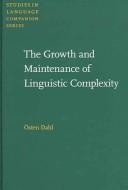| Listing 1 - 2 of 2 |
Sort by
|

ISBN: 9027230811 1588115542 9789027230812 9781588115546 9786612254406 1282254405 9027295255 1423761367 9781423761365 9789027295255 Year: 2004 Volume: 71 Publisher: Amsterdam : John Benjamins,
Abstract | Keywords | Export | Availability | Bookmark
 Loading...
Loading...Choose an application
- Reference Manager
- EndNote
- RefWorks (Direct export to RefWorks)
This book studies linguistic complexity and the processes by which it arises and is maintained, focusing not so much on what one can say in a language as how it is said. Complexity is not seen as synonymous with "difficulty" but as an objective property of a system - a measure of the amount of information needed to describe or reconstruct it. Grammatical complexity is the result of historical processes often subsumed under the rubric of grammaticalization and involves what can be called mature linguistic phenomena, that is, features that take time to develop. The nature and characteristics of
Linguistics --- Complexity (Linguistics). --- Language and languages. --- Complexity (Linguistics) --- Complexiteit (Linguistiek) --- Complexité (Linguistique) --- Langage et langues --- Language and languages --- Taal en talen --- Foreign languages --- Languages --- Anthropology --- Communication --- Ethnology --- Information theory --- Meaning (Psychology) --- Philology --- Linguistic analysis (Linguistics) --- Linguistics. --- Languages & Literatures --- Philology & Linguistics
Book

ISBN: 9783110229219 9783110229226 3110229226 3110229218 9781283857864 1283857863 3111730247 9783111730240 Year: 2012 Volume: 13 Publisher: Berlin Boston
Abstract | Keywords | Export | Availability | Bookmark
 Loading...
Loading...Choose an application
- Reference Manager
- EndNote
- RefWorks (Direct export to RefWorks)
Linguistic complexity is one of the currently most hotly debated notions in linguistics. The essays in this volume reflect the intricacies of thinking about the complexity of languages and language varieties (here: of English) in three major contact-related fields of (and schools in) linguistics: creolistics, indigenization and nativization studies (i.e. in the realm of English linguistics, the "World Englishes" community), and Second Language Acquisition (SLA) research: How can we adequately assess linguistic complexity? Should we be interested in absolute complexity or rather relative complexity? What is the extent to which language contact and/or (adult) language learning might lead to morphosyntactic simplification? The authors in this volume are all leading linguists in different areas of specialization, and they were asked to elaborate on those facets of linguistic complexity which are most relevant in their area of specialization, and/or which strike them as being most intriguing. The result is a collection of papers that is unique in bringing together leading representatives of three often disjunct fields of linguistic scholarship in which linguistic complexity is seen as a dynamic and inherently variable parameter.
Psycholinguistics --- Sociolinguistics --- Complexity (Linguistics) --- Second language acquisition --- Languages in contact --- Study and teaching --- Languages in contact. --- Complexiteit (linguïstiek) --- Taalcontact --- Tweedetaalverwerving --- Study and teaching. --- 800.7 --- 800.7 Taalonderwijs. Taalverwerving --- Taalonderwijs. Taalverwerving --- Complexity (Linguistics). --- Complexiteit (linguïstiek). --- Taalcontact. --- Tweedetaalverwerving. --- Second language learning --- Language acquisition --- Areal linguistics --- Linguistic analysis (Linguistics) --- Second language acquisition Study and teaching --- Second language acquisition - Study and teaching --- Linguistic complexity, second langauge acquisition, contact linguistics, creolistics.
| Listing 1 - 2 of 2 |
Sort by
|

 Search
Search Feedback
Feedback About UniCat
About UniCat  Help
Help News
News